-
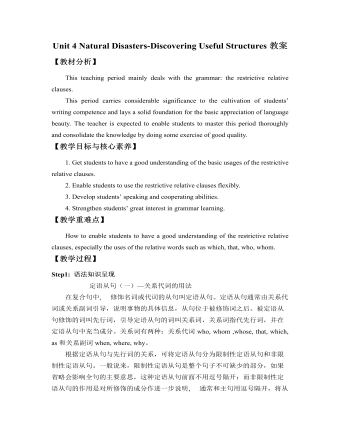
新人教版高中英语必修1Unit 4 Natural Disasters-Discovering Useful Structures教案
【教材分析】This teaching period mainly deals with the grammar: the restrictive relative clauses.This period carries considerable significance to the cultivation of students’ writing competence and lays a solid foundation for the basic appreciation of language beauty. The teacher is expected to enable students to master this period thoroughly and consolidate the knowledge by doing some exercise of good quality.【教学目标与核心素养】1. Get students to have a good understanding of the basic usages of the restrictive relative clauses.2. Enable students to use the restrictive relative clauses flexibly.3. Develop students’ speaking and cooperating abilities.4. Strengthen students’ great interest in grammar learning.【教学重难点】How to enable students to have a good understanding of the restrictive relative clauses, especially the uses of the relative words such as which, that, who, whom.【教学过程】Step1: 语法知识呈现定语从句(一)—关系代词的用法在复合句中, 修饰名词或代词的从句叫定语从句。定语从句通常由关系代词或关系副词引导,说明事物的具体信息,从句位于被修饰词之后。被定语从句修饰的词叫先行词,引导定语从句的词叫关系词,关系词指代先行词,并在定语从句中充当成分。关系词有两种:关系代词who, whom ,whose, that, which, as和关系副词when, where, why。
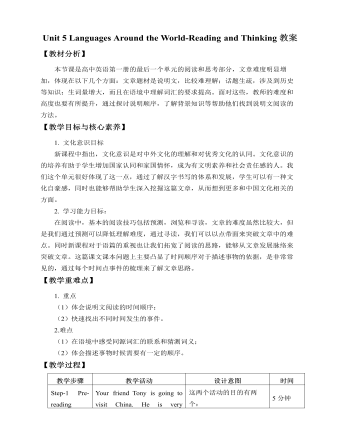
新人教版高中英语必修1Unit 5 Languages Around the World-Reading and Thinking教案
【教材分析】本节课是高中英语第一册的最后一个单元的阅读和思考部分,文章难度明显增加,体现在以下几个方面:文章题材是说明文,比较难理解;话题生疏,涉及到历史等知识;生词量增大,而且在语境中理解词汇的要求提高。面对这些,教师的难度和高度也要有所提升,通过探讨说明顺序,了解背景知识等帮助他们找到说明文阅读的方法。【教学目标与核心素养】1. 文化意识目标新课程中指出,文化意识是对中外文化的理解和对优秀文化的认同。文化意识的的培养有助于学生增加国家认同和家国情怀,成为有文明素养和社会责任感的人。我们这个单元很好体现了这一点,通过了解汉字书写的体系和发展,学生可以有一种文化自豪感,同时也能够帮助学生深入挖掘这篇文章,从而想到更多和中国文化相关的方面。2. 学习能力目标

新人教版高中英语必修2Unit 1 Cultural Heritage-Discovering Useful Structure教案一
This teaching period mainly deals with grammar “restrictive relative clauses.” To begin with, teachers should lead students to revise what they have learned about the relative pronouns and relative adverbs. And then, teachers move on to stress more special cases concerning this grammar, such as the “preposition+ relative pronouns which and whom” and cases where we can omit the relative pronouns. This period carries considerable significance to the cultivation of students’ writing competence and lays a solid foundation for the basic appreciation of language beauty. The teacher is expected to enable students to master this period thoroughly and consolidate the knowledge by doing some exercises. 1. Guide students to review the basic usages of relative pronouns and adverbs of attributive clauses.2. Lead students to learn to use some special cases concerning restrictive relative clauses flexibly.2. Enable students to use the basic phrases structures flexibly.3. Strengthen students’ great interest in grammar learning.1. Help students to appreciate the function of relative pronouns and adverbs of attributive clauses in a sentence2. Instruct students to write essays using the proper relative pronouns and adverbs of attributive clauses.本节语法思考:定语从句在复合句中的作用是什么? 关系词有哪些?定语从句在复合句中的作用相当于形容词,它在句中作定语修饰名词或代词。他们在先行词和定语从句之间起到联系作用,同时在意义上代表先行词并在定语从句中担任一个成分。被定语从句所修饰的词称先行词,定语从句一般放在先行词的后面。
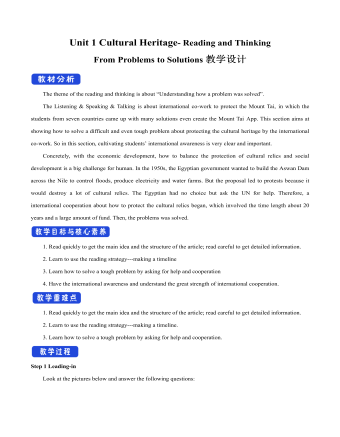
新人教版高中英语必修2Unit 1 Cultural Heritage-Reading and Thinking教案一
The theme of the reading and thinking is about “Understanding how a problem was solved”.The Listening & Speaking & Talking is about international co-work to protect the Mount Tai, in which the students from seven countries came up with many solutions even create the Mount Tai App. This section aims at showing how to solve a difficult and even tough problem about protecting the cultural heritage by the international co-work. So in this section, cultivating students’ international awareness is very clear and important. Concretely, with the economic development, how to balance the protection of cultural relics and social development is a big challenge for human. In the 1950s, the Egyptian government wanted to build the Aswan Dam across the Nile to control floods, produce electricity and water farms. But the proposal led to protests because it would destroy a lot of cultural relics. The Egyptian had no choice but ask the UN for help. Therefore, a international cooperation about how to protect the cultural relics began, which involved the time length about 20 years and a large amount of fund. Then, the problems was solved. 1. Read quickly to get the main idea and the structure of the article; read careful to get detailed information.2. Learn to use the reading strategy---making a timeline3. Learn how to solve a tough problem by asking for help and cooperation4. Have the international awareness and understand the great strength of international cooperation.1. Read quickly to get the main idea and the structure of the article; read careful to get detailed information.2. Learn to use the reading strategy---making a timeline.3. Learn how to solve a tough problem by asking for help and cooperation.

新人教版高中英语必修2Unit 2 Wildlife Protection-Listening and Speaking教案
This lesson is about wildlife protection. The listening and speaking is about “How to protect endangered wildlife ?” Faced with the facts and numbers of wildlife loss, people begin to detect the reasons, then people such as the celebrities (Prince William and Yao Ming) are calling on to protect them. So students are guided to enhance the awareness of protecting wildlife and try to take part in some volunteer activities of protecting wildlife.1. Predict the content by using visuals. 2. Learn to use the sentences such as “I’m concerned about.... But now they are in danger. I want to know the reasons/why./ What can we do to protect them ?3. Learn from the stars like Prince William and Yao Ming and enhance the awareness of protecting wildlife.4. Guide students to try to put forward the solutions to the problems of wildlife protection and then discuss them with partners and present the results of discussion.5. Master the pronunciation of stressed syllables.1. Learn from the stars like Prince William and Yao Ming and enhance the awareness of protecting wildlife.2. Guide students to try to put forward the solutions to the problems of wildlife protection and then discuss them with partners and present the results of discussion.3. Learn to use the sentences such as “I’m concerned about.... But now they are in danger. I want to know the reasons/why./ What can we do to protect them ?4. Master the pronunciation of stressed syllables.Part A Listening and Speaking--- How to save endangered wildlifeStep 1 Lead in1. Point at the pictures on P14 and ask Q1: What message do these posters share?

新人教版高中英语必修2Unit 3 The Internet-Listening &Speaking&Talking教案二
From the pictures in the text and the title--- choose the best app, we can know that this part is about how to save money by using apps.Step 2 While-listening1. Laura and Xiao Bo are talking about apps. Listen to their conversation and find out what apps they want.Xiao Bo is looking for a(n) exercise app to help him get in shape.Laura would like an app for getting rich and another that will make her grades better.2. Listen again. Are the sentences true T or false F?1). Both of Xiao Bo's apps keep track of the steps he takes._____2). Xiao Bo's second app can help him make a fitness plan._____3). Laura needs an app that will help her get discounts.______4). Laura needs an app that will add money to her bank account._______F T F T3. Listen once more and tick the sentence you hear. Underline the words used to express predictions, guesses, and beliefs.Predictions, Guesses, and Beliefs________It might help me walk more.________My guess is that it wouldn't work.________I imagine this app would help me get fit faster________I suppose that would be good.________I guess you could save a little with this app.________I suppose there would be some problems, too.________I believe this app could help me get thinner.

新人教版高中英语必修2Unit 4 History and Traditions-Listening&Speaking&Talking教案一
This unit is about history and traditions. From the opening page, we can know that this unit will introduce the history and traditions around the world. As Marcus Garvey says “A people without the knowledge of their past history, origin and culture is like a tree without roots”, it is important for students to realize the importance and value of knowing the history and traditions and their further meanings. And this part ( listening and speaking ) is divided into two parts: Part A---share views on historic sites, Part B ---talk about a visit to a historic tourist destination. By talking with a foreigner, the speakers introduce the historic attractions and their cultures. Part A is that William, a British student, who was going to visit the Confucius Temple and a Chinese student, Xiao Kong, who was going to the Confucius Temple to meet with the members of the research group, went together and exchanged their views on the Confucius Temple, Confucius, Confucius' descendants and Confucius' educational thoughts. Part B is a conversation between Xiao Yan, a youth hostel receptionist and Paul, a backpacker about the feelings and experience after visiting the Chinese famous tourist attraction Pingyao.1. Guide students to understand the content of listening texts in terms of the whole and key details; 2. Cultivate students' ability to guess the meaning of words in listening; discuss with their peers how to talk about historic spots and great person.3. Instruct students to use functional sentences of showing one’s excitement, surprise and disappointment.1. Guide students to understand the content of listening texts in terms of the whole and key details; 2. Cultivate students' ability to discuss with their peers the related topics.3. Enable students to use the functional items of showing one’s excitement, surprise and disappointment.

新人教版高中英语必修2Unit 4 History and Traditions-Listening&Speaking&Talking教案二
Listening and Speaking introduces the topic of “Take part in a youth project”. The listening text is an interview about "sharing views on historical sites". Through listening to a dialogue between Chinese and foreign students on the way to the Confucius Temple, students can understand their views on the Confucius Temple, Confucius, Confucius' descendants and Confucius' educational thoughts, so as to realize and think about the profound influence of Confucius and his thoughts on Chinese historical tradition. At the same time, the dialogue naturally integrates English idioms and mentions Shakespeare, the British playwright, so as to provide language materials and context for students to understand English idioms and related cultural allusions, as well as to compare Chinese and foreign cultures, which is helpful for students to understand and express the language such as history, tradition, culture and custom significant impact.Text analysis: listening text is a dialogue between a British student and a Chinese student when he goes to the Confucius Temple. When William, a British student, visited the Confucius Temple, he asked Xiao Kong, a Chinese student, for directions. Xiao Kong was just going to the Confucius Temple to meet with the members of the research group, so they went together and exchanged their views on the Confucius Temple, Confucius, Confucius' descendants and Confucius' educational thoughts. From the perspective of foreign tourists, this paper describes their thoughts on Confucius, the great son of Confucius, who had a profound impact on Chinese history and cultural tradition, and his education.Listening and Talking introduces a visit to a historic tourist destination. Tourism is a common way to understand a country's history, culture, and customs and so on. Students listen to the dialogue between Xiao Yan, a youth hostel Usher, and Paul, a backpacker, to learn about Pingyao's famous historical and cultural attractions and Paul's travel experience and experience as a foreign tourist.

新人教版高中英语必修2Unit 5 Music-Listening&Speaking&Talking教案
choir memberspeople to run food stands people to sell festival ticketspeople to sell music CDspeople to set up equipmentmusical performersStep 2: Listen to the announcement again and answer the questions. ? 1. What kind of songs will Grace Davis sing at the festival?? 2. Who can try out as a performer?? 3. What can those who think they do not have musical talent do?? 4. How can students volunteer to take part?? Talking about preferences:? Would you prefer doing ..?? What would you prefer to do?? Would you rather do .... or ….?? What would you rather do?? I'd prefer .... to ..? I'd rather have ... than .. Step 3: Speaking ProjectWork in groups. Role-play the conversation or make a new one.? Debbie: Where have you been? You missed the announcement about the music festival.? John: I was at the doctor's office. Music festival?? Frank: Yes, it's going to be next month on the school sports field. John, you can play the piano. How about playing it at the festival?? John: Well, I'd rather play the violin. I can play Liang Zhu.? Frank: Wow! Sounds good. What about you, Debbie? ? Debbie: Actually, I don't have much musical ability. I'd prefer just to help out with the crowds.? Frank: You can sell tickets or work at a food stand.? John: So can I assume that the aim of the festival is to raise money?? Debbie: Yes. All of the money will go to charity.

新人教版高中英语必修2Unit 5 Music-Reading for Writing教案二
The Internet celebrity Gao Yifeng. Years ago, he owned 5 companies and the staffs over 1,000, but during the economy crisis, he became nothing but debt. He was so worried that his hair became white overnight. There was a time when he wanted to killed himself. But after listening to the song Start Over by Liu Huan, he decided to cheer himself up. He started a steamed bun shop and gradually became a national chain shops. Now he became successful again.Walter Haddon said, “Music is the medicine of a troubled mind.” Music contains such a pleasant and inspiring force. Music gave him courage and bravery. When he listened to the song, it made his spirit fly like a kite in the wind. Music gave him strength and brought him relief. It was the rock I leant on to become strong and to get through those hard times. I hope none of us have to go through the same kind of suffering that he did. At the same time, we all go through various periods when we feel sad or alone. During those times, music can help us in the same way that it helped him. I hope we all will somehow begin to treasure music and make it a part of our life. Thank you for your listening !5.Revise your writing each other.Does he/she explain how music has changed his/her/someone else’s life?Are some of the rhetorical devices included and used properly ?Does he/she talk about how music makes him/her/someone feel?Is the first word in each sentences capitalised?Does he/she use correct punctuation ?
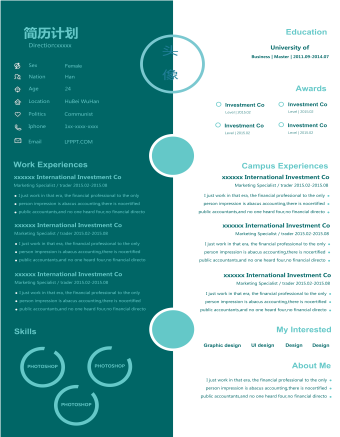
中英文简历
I just work in that era, the financial professional to the onlyperson impression is abacus accounting,there is nocertified publicaccountants,and no one heard four,no financial directo.
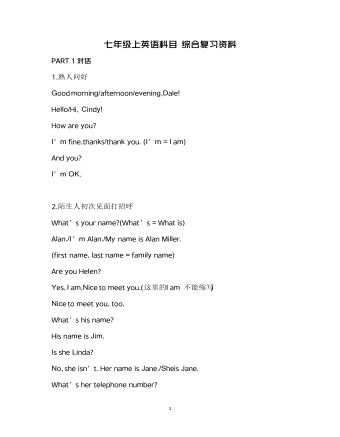
部编版英语七年级上总复习知识点教案
2.陌生人初次见面打招呼What’s your name?(What’s = What is)Alan./I’m Alan./My name is AlanMiller.(first name,last name = family name)Are you Helen?Yes, I am.Niceto meet you.(这里的Iam 不能缩写)Nice to meetyou, too.What’s his name?His name isJim.Is she Linda?
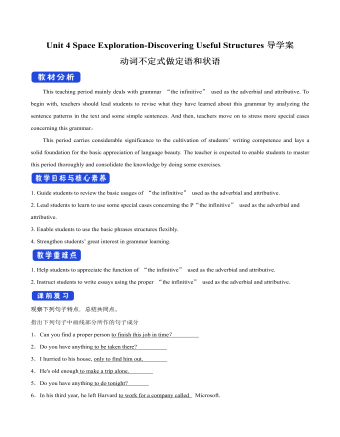
新人教版高中英语必修3Unit 4 Space Exploration-Discovering Useful Structures导学案
【点津】 1.不定式的复合结构作目的状语 ,当不定式或不定式短语有自己的执行者时,要用不定式的复合结构?即在不定式或不定式短语之前加 for +名词或宾格代词?作状语。He opened the door for the children to come in. 他开门让孩子们进来。目的状语从句与不定式的转换 英语中的目的状语从句,还可以变为不定式或不定式短语作状语,从而使句子在结构上得以简化。可分为两种情况: 1?当目的状语从句中的主语与主句中的主语相同时,可以直接简化为不定式或不定式短语作状语。We'll start early in order that/so that we may arrive in time. →We'll start early in order to/so as to arrive in time. 2?当目的状语从句中的主语与主句中的主语不相同时,要用动词不定式的复合结构作状语。I came early in order that you might read my report before the meeting. →I came early in order for you to read my report before the meeting.
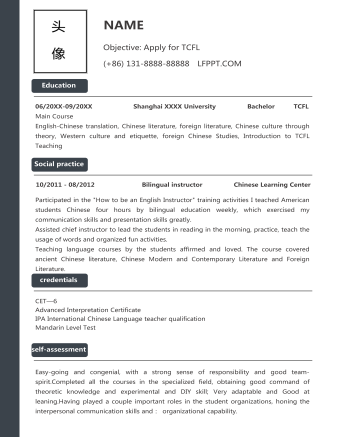
教师通用简约英文简历
Participated in the "How to be an English Instructor"training activities I teached American students Chinese four hours by bilingualeducation weekly, which exercised my communication skills and presentationskills greatly.Assisted chief instructor to lead the students in reading in themorning, practice, teach the usage of words and organized fun activities.Teaching language courses by the students affirmed and loved. Thecourse covered ancient Chinese literature, Chinese Modern and ContemporaryLiterature and Foreign Literature.
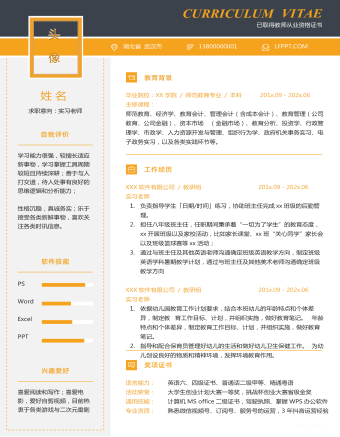
师范英语教师简历
XXX软件有限公司 / 教研组 201x.09 - 202x.06实习老师1. 负责指导学生「日期/时间」练习,协助班主任完成xx班级的后勤管理。2. 担任八年级班主任,任职期间秉承着“一切为了学生”的教育态度,xx开展班级以及家校活动,比如家长课堂、xx班“关心同学”家长会以及班级篮球赛等xx活动;通过与班主任及其他英语老师沟通确定班级英语教学方向,制定班级英语学科暑期教学计划,通过与班主任及其他美术老师沟通确定班级教学方向
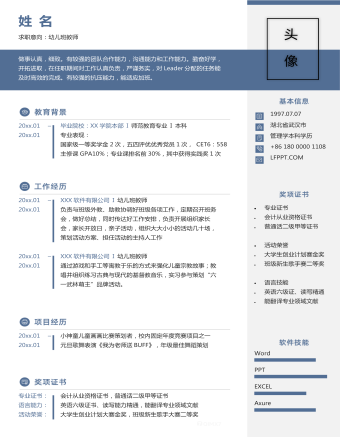
简历英语幼教模板
XXX软件有限公司 I 幼儿班教师负责与班级外教、助教协调好班级各项工作,定期召开班务会,做好总结,同时传达好工作安排,负责开展组织家长会,家长开放日,亲子活动,组织大大小小的活动几十场,策划活动方案、担任活动的主持人工作XXX软件有限公司 I 幼儿班教师通过游戏和手工等寓教于乐的方式来强化儿童宗教故事;教唱并组织练习古典与现代的基督教音乐,实习参与策划“六一武林萌主”品牌活动。
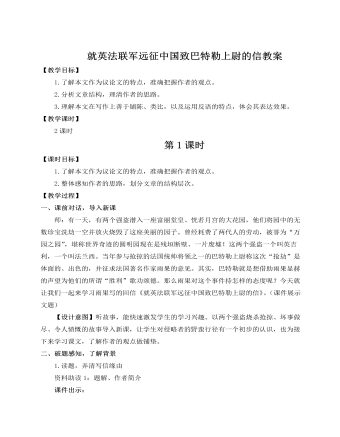
人教部编版语文九年级上册就英法联军远征中国致巴特勒上尉的信教案
【设计意图】以课文为本,积累知识,领会其写法,提高阅读鉴赏能力是必须的,但文中的知识点很多,时间有限,教师不可能面面俱到。故本板块设计侧重反语的表达效果,教师启发引路为辅,学生合作探究为主。三、总结交流,拓展延伸学完本文,我们思绪万千,有对雨果的钦佩,有对英法联军的痛恨,有对清政府的愤懑,有对战争的厌恶……请以《,我想对你说》为题,说一段话,谈谈你的感想。【设计意图】学以致用,才是教学的最好归宿。引导学生与文本中的人、事对话,既可加深学生对所学知识的理解,又可锻炼学生运用知识、独立思考的能力,还能激发为振兴中华而发愤图强的爱国激情。结束语:一代名园圆明园毁灭了,它毁于英法侵略者之手,也毁于清政府的腐败无能。它的毁灭,既是西方侵略者野蛮摧残人类文化的见证,又是文明古国落后也要挨打的证明,我们中华民族不想欺侮其他民族,但也决不能允许别人欺侮我们。少年强,则中国强!同学们,为了中华民族的伟大复兴,为了圆明园类似的悲剧不再发生,我们要勤奋学习,努力奋斗!
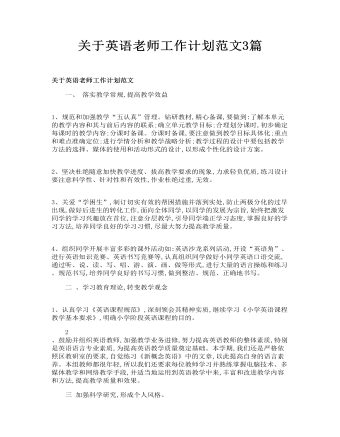
关于英语老师工作计划范文3篇
1、规范和加强教学“五认真”管理。钻研教材,精心备课,要做到:了解本单元的教学内容和其与前后内容的联系;确立单元教学目标;合理划分课时,初步确定每课时的教学内容;分课时备课。分课时备课,要注意做到教学目标具体化;重点和难点准确定位;进行学情分析和教学战略分析;教学过程的设计中要包括教学方法的选择、媒体的使用和活动形式的设计,以形成个性化的设计方案。??2、坚决杜绝随意加快教学进度、拔高教学要求的现象,力求轻负优质,练习设计要注意科学性、针对性和有效性,作业杜绝过重,无效。
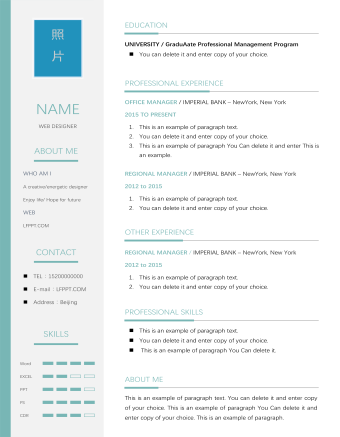
英伦商务应届生英文简历
OFFICEMANAGER / IMPERIAL BANK – NewYork, New York 2015 TOPRESENT1. This is anexample of paragraph text. 2. You candelete it and enter copy of your choice. 3. This is anexample of paragraph You Can delete it and enter This is an example.REGIONALMANAGER / IMPERIAL BANK – NewYork, New York 2012 to20151. This is anexample of paragraph text. 2. You candelete it and enter copy of your choice.
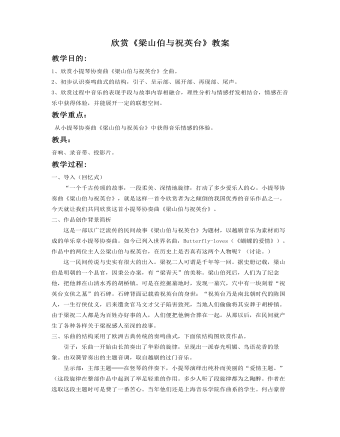
欣赏《梁山伯与祝英台》教案
一、导入(回忆式) “一个千古传颂的故事,一段柔美、深情地旋律,打动了多少爱乐人的心。小提琴协奏曲《梁山伯与祝英台》,就是这样一首令欣赏者为之倾倒的我国优秀的音乐作品之一。今天就让我们共同欣赏这首小提琴协奏曲《梁山伯与祝英台》。二、作品创作背景简析这是一部以广泛流传的民间故事《梁山伯与祝英台》为题材,以越剧音乐为素材而写成的单乐章小提琴协奏曲。如今已列入世界名曲,Butterfly-loves(《蝴蝶的爱情》)。作品中的两位主人公梁山伯与祝英台,在历史上是否真有这两个人物呢?(讨论。)这一民间传说与史实有很大的出入。梁祝二人可谓是千年等一回。据史册记载,梁山伯是明朝的一个县官,因秉公办案,有“梁青天”的美称。梁山伯死后,人们为了纪念他,把他葬在山清水秀的胡桥镇。可是在挖掘墓地时,发现一墓穴,穴中有一块刻着“祝英台女侠之墓”的石碑。石碑背面记载着祝英台的身世:“祝英台乃是南北朝时代的陈国人,一生行侠仗义,后来遭贪官马文才父子陷害致死,当地人们偷偷将其安葬于胡桥镇。由于梁祝二人都是为百姓办好事的人,人们便把他俩合葬在一起。从那以后,在民间就产生了各种各样关于梁祝感人至深的故事。三、乐曲的结构采用了欧洲古典传统的奏鸣曲式,下面依结构图欣赏作品。引子:乐曲一开始由长笛奏出了华彩的旋律,呈现出一派春光明媚、鸟语花香的景象。由双簧管奏出的主题音调,取自越剧的过门音乐。呈示部:主部主题──在竖琴的伴奏下,小提琴演绎出纯朴而美丽的“爱情主题。”(这段旋律在整部作品中起到了举足轻重的作用。多少人听了段旋律都为之陶醉。作者在选取这段主题时可是费了一番苦心。当年他们还是上海音乐学院作曲系的学生。何占豪曾在杭州越剧团当演员,他对越剧音乐既熟悉又喜爱。在创作《梁祝》时,故事流传在浙江一带,越剧是浙江的代表剧种,他决心从越剧音乐中取材。据平时的观察,许多越剧名演员,不论他们演出任何剧目,只要唱到一段唱腔时,台下都会博得热烈地掌声为之呼应。作者抓住了这段唱腔作为《梁祝》中“爱情主题”的基本音调。这段主题是全曲的核心的音调。)
